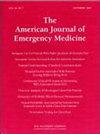Impact of desmopressin on hematoma expansion in patients presenting to the emergency department on antiplatelet therapy: Don't expand study
IF 2.7
3区 医学
Q1 EMERGENCY MEDICINE
引用次数: 0
Abstract
Introduction
Current guidelines state the effectiveness of desmopressin to reduce hematoma expansion in antiplatelet-related intracerebral hemorrhage (ICH) is uncertain. This study sought to determine if desmopressin decreased hematoma expansion in ICH patients on antiplatelet agents.
Methods
We conducted a multi-center, retrospective propensity-matched cohort study at 11 US emergency departments (ED) that participate in EMPHARM-NET. Adult patients ≥18 years with a primary diagnosis of spontaneous ICH on antiplatelets prior to admission from January 1, 2017 through May 1, 2021 were included. The primary endpoint was good or excellent hemostatic efficacy within the first 24 h following ICH between patients that did and did not receive desmopressin. Brain imaging was reviewed using 3D-Slicer by blinded expert physicians.
Results
Overall, 1408 patients were evaluated for inclusion. A total of 324 patients were included, of which 13.8 % (n = 45) received desmopressin and 86.1 % (n = 279) did not. After propensity matching, 35 patients receive desmopressin compared to 140 controls. Baseline hematoma volume (27.6 mL vs. 2.1 mL) and was significantly higher in the desmopressin group. The primary endpoint of good or excellent hemostatic efficacy was similar between groups (74.3 % desmopressin group vs. 85 % control group, −10.7 % [−28.1 % to 6.7 %]). There was no difference in secondary outcomes.
Conclusion
In this multicenter cohort, patients receiving desmopressin had higher baseline intraparenchymal hematoma volume, and did not appear to result in improved hemostatic efficacy relative to the control group. These results suggest against routine administration of desmopressin for antiplatelet-related ICH, though future study in a randomized trial design is necessary.
去氨加压素对急诊科接受抗血小板治疗患者血肿扩张的影响:不要扩大研究
目前的指南指出去氨加压素减少抗血小板相关性脑出血(ICH)血肿扩张的有效性尚不确定。本研究旨在确定去氨加压素是否能降低使用抗血小板药物的脑出血患者的血肿扩张。方法:我们在参与empharma - net的11个美国急诊科(ED)进行了一项多中心、回顾性倾向匹配队列研究。纳入2017年1月1日至2021年5月1日入院前初步诊断为自发性脑出血的≥18岁成人患者。主要终点是接受去氨加压素治疗和未接受去氨加压素治疗的患者在脑出血后的前24小时内止血效果良好或优异。脑成像由盲法专家医师使用3d切片机进行复查。结果共纳入1408例患者。共纳入324例患者,其中13.8% (n = 45)接受去氨加压素治疗,86.1% (n = 279)未接受。倾向匹配后,35例患者接受去氨加压素治疗,对照组140例。去氨加压素组基线血肿体积(27.6 mL对2.1 mL)和显著高于去氨加压素组。两组间止血效果良好或优异的主要终点相似(去氨加压素组74.3% vs对照组85%,−10.7%[−28.1% ~ 6.7%])。次要结果没有差异。结论在这个多中心队列中,接受去氨加压素治疗的患者有更高的肺实质内血肿容量基线,并且与对照组相比,止血效果似乎没有改善。这些结果表明,抗血小板相关性脑出血不应常规应用去氨加压素,但未来的随机试验设计研究是必要的。
本文章由计算机程序翻译,如有差异,请以英文原文为准。
求助全文
约1分钟内获得全文
求助全文
来源期刊
CiteScore
6.00
自引率
5.60%
发文量
730
审稿时长
42 days
期刊介绍:
A distinctive blend of practicality and scholarliness makes the American Journal of Emergency Medicine a key source for information on emergency medical care. Covering all activities concerned with emergency medicine, it is the journal to turn to for information to help increase the ability to understand, recognize and treat emergency conditions. Issues contain clinical articles, case reports, review articles, editorials, international notes, book reviews and more.

 求助内容:
求助内容: 应助结果提醒方式:
应助结果提醒方式:


